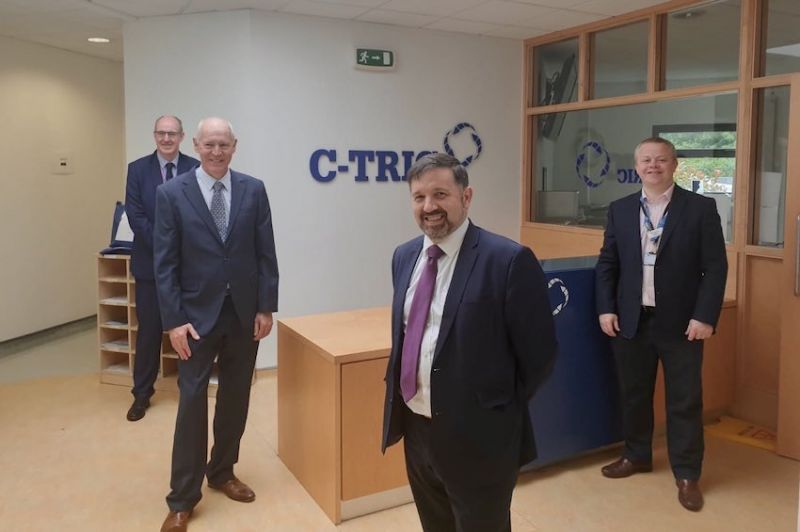One such example of partnership working, in response to COVID-19, is the work being undertaken with the Western Health and Social Care Trust (WHSCT), led by Professor Colum Walsh, in establishing and resourcing viral diagnostic tests. Professor Colum Walsh, who is based in the Biomedical Sciences Research Institute at Coleraine (BMSRI), is the Diagnostics Lead in the COVID-19 Consortium and he has been working with Dr Vanesa Devine (C-TRIC), Dr Taranjit Singh Rai (C-TRIC, Northern Ireland Centre for Stratified Medicine), Dr. Coral Lapsley and Dr. Andrew English (Centre for Personalised Medicine (CPM), C-TRIC), clinicians and biomedical scientists within the WHSCT, to establish and develop COVID-19 testing at Altnagelvin Hospital’s laboratories.
Professor Walsh, assisted by Dr Sara-Jayne Thursby (Biomedical Sciences Research Institute, Coleraine) and Dr Ben Wingfield (School of Computing, Engineering & Intelligent Systems, Magee/ CPM, C-TRIC) is also assisting the Public Health Agency with ‘Contact Tracing’ of people who have had exposure to COVID-19 .
Professor Colum Walsh, Professor of Genetics, explains:
“The research activity that I am undertaking with my colleagues, Dr Sara-Jayne Thursby and Dr Ben Wingfield, in analysis of contact tracing data for those individuals who have tested positive with COVID-19 is crucial if we are to reduce viral spread and to help identify new clusters and patterns of transmission.
“Establishing effective contact tracing protocols is vitally important in avoiding a second wave of COVID-19 infection when Northern Ireland exits from lockdown, with people returning to work and schools reopening.”
Along with Professor Tony Bjourson and a team from Ulster University, Professor Walsh has helped raise £112,271 to purchase urgently needed robotics equipment for COVID-19 testing at Altnagelvin Hospital Laboratories, with the equipment installed in May. This automation equipment will increase the daily testing capacity provided by the WHSCT.
Another member of our research community, Dr David Gibson is leading an Ulster University Serology team (Dr Taranjit Singh Rai, Dr Andrew English, Dr Coral Lapsley Northern Ireland Centre for Stratified Medicine, C-TRIC) that is undertaking work as part of NI COVID-19 Testing Scientific Advisory Consortium, assessing antibody responses in COVID-19 patients and providing seroprevalence data to the Department of Health and Public Health Agency in NI.
Dr Gibson is the Ulster University representative on the COVID-19 Serology Task Force which was established to evaluate antibody tests, collate suitable samples for test evaluation and perform pilot seroprevalence studies.
David is also a member of the WHSCT-UU Lab committee, established to assist WHSCT in establishing and resourcing virus and antibody tests.
Dr David Gibson, Senior Lecturer in Stratified Medicine, said:
“Antibody testing is particularly useful at a population level to track the prevalence of infection at any point in time (seroprevalence). Studies are being run across the UK and the world by health authorities to assess what proportion of the population have already been exposed and developed an immune reaction to the virus. It is however too early to say whether presence of antibodies being detected by these tests confer long lasting immunity, though this is an active area of research.
“The work on antibody tests in Northern Ireland will ultimately help guide control measures and forward planning, provide insight into the transmission of the virus, and identify potential donors for convalescent serum therapy.”
Professor Tony Bjourson (Northern Ireland Centre for Stratified Medicine & Centre for Personalised Medicine, C-TRIC) who led the Ulster University COVID-19 Task Force and represents Ulster University on the NI COVID-19 Testing Scientific Advisory Consortium, adds:
“In the current pandemic of SARS-CoV-2, I would like to acknowledge all our researchers for the vital work being undertaken around important elements of the COVID-19 response, including screening for the SARS-CoV-2 virus, testing for immunity and improving contact tracing procedures, with the aim of averting a feared second wave of the virus.
“Professor Walsh and Dr. Gibson and their teams should be commended for their focus and commitment to improving SARS-CoV-2 screening.
“I would like to take this opportunity to thank the Ulster University community and wider public for their donations to the successful crowdfunding project which raised over £112,000 to purchase a robotic RNA purification machine which can increase output to as much as 500 tests a day. Without these donations, the increase in testing capacity could not have been achieved.”

